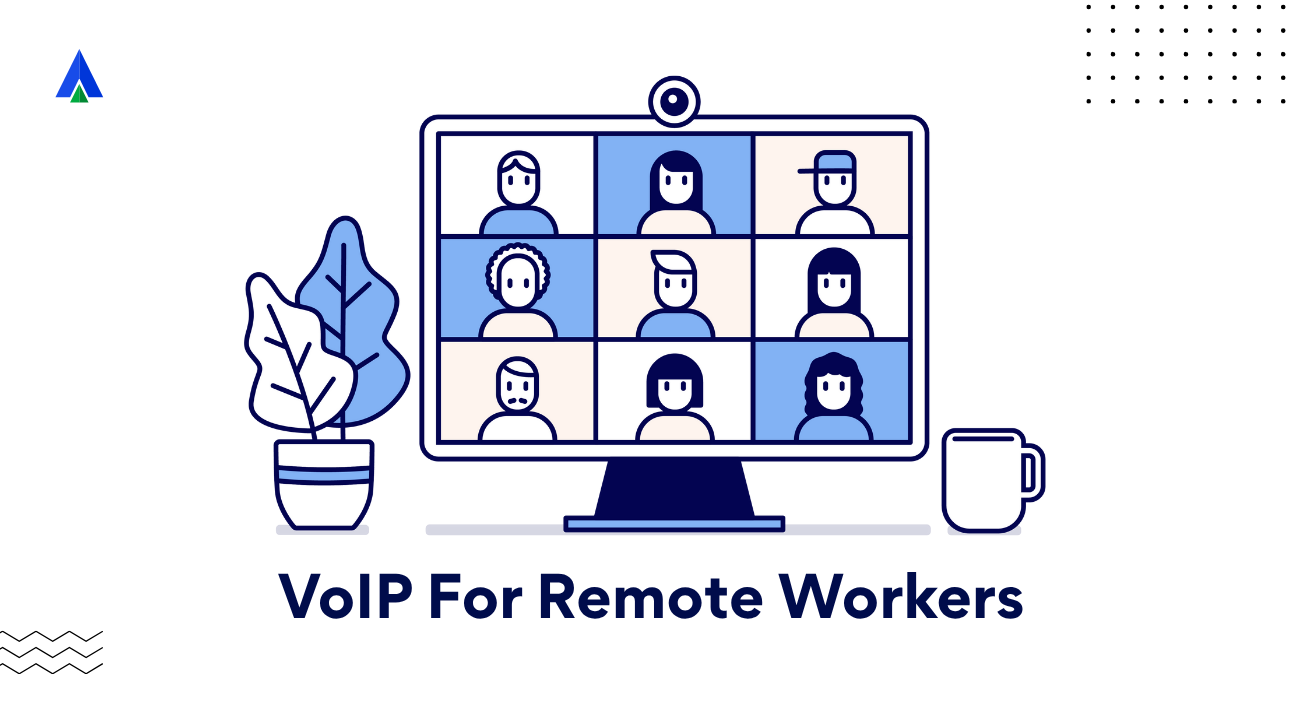Business phones are crucial components of business communications. Not only are they needed for interacting with customers, but they also enable seamless communication between employees.
Over time, offerings of business phones have improved tremendously. From being a measly phone box, crawling its wires across the office floors, business phone lines are now taking the advantages of cloud communications.
Transitioning to VoIP based services, business phone lines are now more equipped to handle business communication. They now have a plethora of features that enable them to route calls automatically, integrate with smart IVR systems, manage callers through an auto-attendant or virtual receptionist, or even enable automatic calls through different types of auto-diallers.
However, when it comes to making a decision, an overflow of information on the types of business phones may often confuse business leaders. Every type of phone system has its pros and cons, but it is up to the requirements of a business to identify which of the features suit them the most.
In this article, we will talk about three different types of phone systems that you can choose from. We will list out what each of them offers their benefits and their shortcomings. Let us dive straight in.
Dedicated VoIP phones
Voice over Internet Protocol (VoIP) is, simply put, a method to communicate voice through the Internet. One can look at it as a method to place and receive phone calls through the Internet. Behind the obvious, of course, is a group of technologies that capture, transmit and receive voice across two or more users who are connected to the Internet.
Voice over IP converts voice into a digital signal, compresses it, and then sends it over the Internet. A VoIP service provider sets up the call between all intended participants. On the receiving end, the digital data is then uncompressed and converted back into the voice. At both ends, necessary are devices that have a microphone and a speaker.
In usage, VoIP phones look similar to regular desk phones. Apart from the regular earpiece or speaker for calls, they also have a small screen to display information along with a variety of buttons for specific functions. They are available in a wide variety at different price points. The more expensive ones usually provide colour and touch-sensitive screens, better quality hardware and support HD voice for better clarity.
Advantages of VoIP
There are many benefits to using VoIP phone system, or IP telephony if you prefer to use the nomenclature, for business. Here are the top four:
-
Direct cost savings
With IP telephony, you pay only for your Internet connection. All calls between people using VoIP are free, even international calls made over long distances.
-
Features
Current IP telephony implementations are feature rich. From call forwarding, call blocking, caller ID, voicemail, to remote management, automatic call distribution and Interactive Voice Response, the list runs long and deep. These features not only make communication efficient but also drive down total costs of ownership.
-
Collaborative working
With seamless integration of VoIP with other systems, IP telephony implementation enables individuals and teams to collaborate through voice, video, web conferencing or instant messaging—all from a single user interface.
-
Higher productivity
Employees can use the communication system flexibly and remotely, whenever and wherever. And at the same time, they have access to data that they need to remain productive.
Potential risks to VoIP implementation
While it is well established that IP telephony is more efficient, more flexible and available at lower costs than traditional phone systems, it is pertinent to know the potential risks and problems with a plan in place to mitigate them. The top four are:
-
Bandwidth dependence
IP telephony runs on your Internet connection. Any outage of your Internet connection will also bring down your communications. Even insufficient bandwidth can cause quality-related issues with your implementation. Hence it is imperative to have a fail-safe Internet connection.
-
Quality of audio
Beyond the bandwidth of your broadband connections, other related hardware and services, if insufficient, may cause latency, noise or echo in voice or video communication. It is important to plan accordingly.
-
Security
It is certainly a major consideration with IP telephony implementations. Usual Internet-related threats like phishing, identity theft, malware, spamming, call tampering are all relevant here as well. You need to continue to invest in Infrastructure and cloud security. The good part is that the enterprise-wide security implementations all become effective on IP telephony implementations as well. Regular security audits and correctives that you run for your organisation work here.
-
Extra costs
If you use VoIP to call someone without VoIP capabilities, you may incur additional costs. Hence it is important to plan accordingly.
Softphones
Softphones are nothing but a software implementation to VoIP. It is based on IP protocols that allow you to call someone using just software. You do not need a telephone system to make and receive VoIP calls.
Many service providers offer dedicated software that your employees can install on their laptops, tablets or mobile phones. Applications are available that work with any VoIP service. These applications are usually called softphones to distinguish and differentiate them from the hardware you would normally use for calling.
Ready to streamline your outbound calls? Explore softphone solutions today and empower your Outbound Call Center with flexible, cost-effective communication tools.
Advantages of softphones
One of the biggest advantages of softphones is flexibility and portability. You can install the software on any device you use. Your employees can then communicate with your customers, colleagues and team wherever and wherever.
Other benefits include:
-
Works on all existing devices
Softphones, like mentioned above, are just software implementation of VoIP services. They are similar to applications that your computer runs. Thus, this makes it possible to add a softphone to your existing hardware, without revamping your entire network of systems.
-
Doesn’t need a dedicated phone line
Based on VoIP, softphones use the Internet to carry data packets. This negates the need to install a brand-new phone line connection, saving your business immense costs in the installation and maintenance of these phone lines.
-
Stay up to date
Having your phone system run like an application gives you the benefit of instant upgrades, anytime and anywhere. All you need is an Internet connection, and your phone system will update to the newest software, adding many additional features to improve your business communications.
Potential risks to softphone implementation
Since they are technically built on the same technology, softphones will have similar issues that a business would face if they used a dedicated VoIP system.
Additionally, in the modern age of cloud telephony, with businesses increasingly promoting remote working capabilities, cloud providers are taking notice. They are now combining the benefits of both dedicated VoIP systems and softphones—selling them as one combined package. This, while may seem like the best of both worlds, often implores businesses to pay a larger subscription fee.
Mobile devices with VoIP
If you see it in isolation, turning your mobile device into your business phone is filled with benefits. With almost a worldwide spread of mobile phones, with increasing rates of smartphone and Internet penetration, mobile devices allow connections with almost every individual, across the world. However, diving a little deep, you begin to see why large-scale businesses do not rely on this novice idea.
Advantages of mobile devices
With smartphones rising in numbers and becoming more capable than ever, our mobile devices can do a whole lot more than traditional business phone systems. Some of the advantages include:
-
Easy access
Business leaders can access all company material right from their mobile devices. With mobile devices coming in all shapes and sizes, and with most of them being equipped with the Internet, gone are the days of tiny keys and screens to reply and read texts.
-
Always present
When was the last time you stepped out of your house without your phone? Exactly! Businesses can be connected with each other, their employees, and their customers, across the world, at any time of the day.
-
Better mobility
With a mobile device, employees are not restricted to one place or location. Working at home, as popularised by the pandemic, is a much simpler task if your business communication system can fit inside your pocket, wherever you go.
Potential risks with using mobile devices as business phones
While it may seem like a dream to have your work in your pocket, using your mobile device as a business phone may lead to many different issues:
-
Compromise a work-life balance
With your mobile device always on your person, you can lose track of the distinction between work hours and personal time. Constant phone calls—even after work hours, replying to emails as and when they are received, may not be the best use of your phone.
-
Decreases focus
All of our personal lives are stored in our phones. This means that you may be easily distracted while working from unnecessary phone calls or texts that can eat into your productivity.
-
Security
While phone devices are increasingly getting more secure, there still is room for improvement. Moving your business communications on unsecured platforms may risk the loss of data, hacks, or even drown you in legal disputes over customer privacy.
Dedicated VoIP phones, Softphones or mobiles with VoIP solution
The answer to this is: “it depends.” They all have their benefits and come at different costs as well. The final decision lies with the actual needs of an organisation.
In a nutshell, while large enterprises may have a need for a hybrid implementation of VoIP phones and softphones, most small and medium businesses can opt for softphones and yet have access to the benefits of a cloud transformation.














